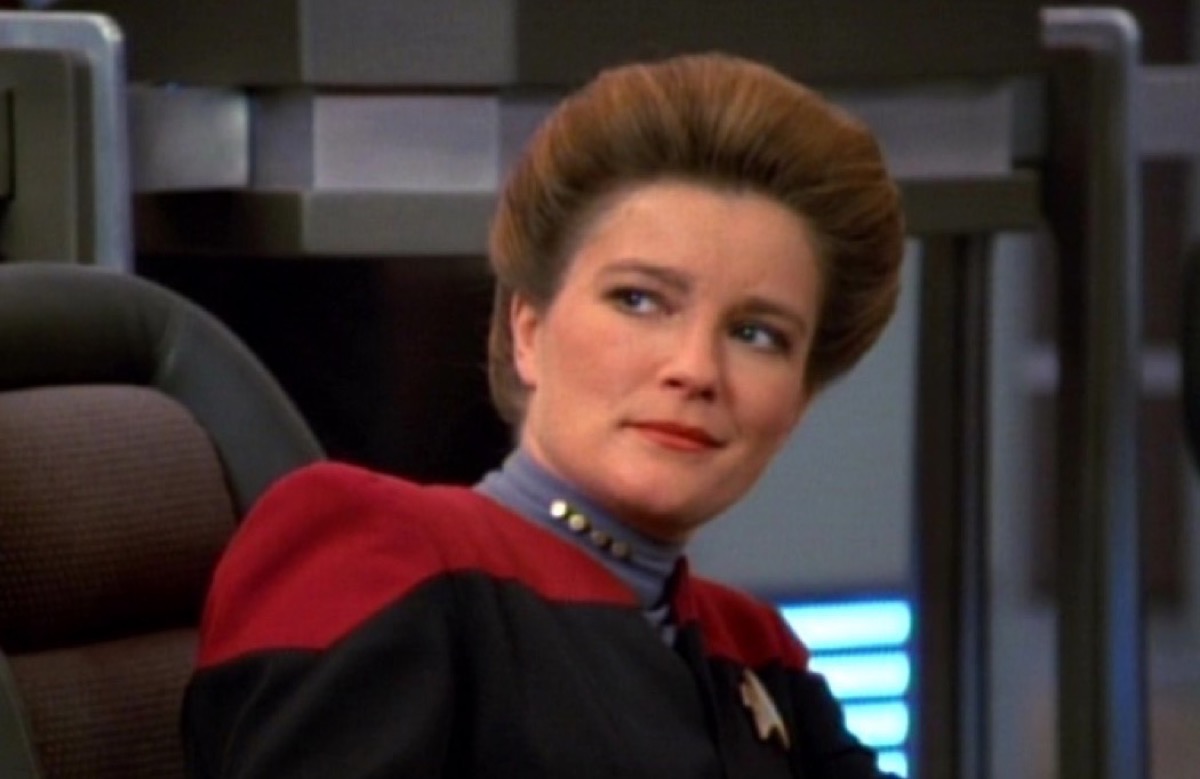Why Captain Janeway Still Feels So Relevant 25 Years After Going Where No Woman Had Gone Before

This year marks the 25th since Star Trek: Voyager first appeared on television. In some ways, it was like every other Star Trek show before it—see rubber foreheads, colorful uniforms, and moral of the week—but there was one element that really stood out: Kate Mulgrew was cast to play the franchise’s first female captain.
In an Entertainment Weekly article from 1995, Robert Beltran (who played the show’s second-in-command, Commander Chakotay) didn’t hold back. “There’s really no precedent for her situation. Except maybe Joan of Arc,” he said, “And she had the anointing of God.”
It’s a little bizarre reading this comment today. Was it ever really that big of a deal to have a woman in the captain’s chair? And now, a quarter of a century later, is Captain Janeway still relevant?
As a 25-year-old woman, Janeway has always existed in my pop culture universe. I can mark the progression of sexism over the course of my life through our responses to Janeway, all the way to to how normal it now seems to see her in the driver’s seat. In many ways, Voyager is not contemporary TV. Like so many other ’90s sci-fi shows, there’s plenty of racism (cue the background flute signaling that Chakotay, the only Native American character, was onscreen) and uncomfortably voyeuristic shots of female characters.
However, Captain Janeway remains beloved by many Trek fans, particularly women. Other elements of the show might feel dated, but she doesn’t.
It would be easy to write this loyalty off as the byproduct of good characterization in a classic universe, and sure, Janeway is an inspiring leader played by a charismatic actress, but that isn’t her whole story. Over the course of seven seasons, she makes plenty of decisions that wouldn’t make it to the screen today. In one particularly uncomfortable episode, the Captain realizes she was “too quick” to believe a female crew member’s story of being physically assaulted.
Of course, there are also tonnes of genuinely moving Captain Janeway moments. But she isn’t a perfect role model for 21st century empowerment either. So why does she still feel so contemporary?
You don’t have to look particularly hard to find courageous and intelligent female leads on television today. These women are usually framed as feminist fighters (even if they’re “regular” people), who succeed despite the sexism around them. Even when female characters are remarkably unaffected by sexism, writers will often insert Very Special Sexism Episodes to seem more in touch with reality (think of Amy suddenly revealing her past sexual harassment in Brooklyn Nine-Nine). Of course, it’s still exciting to have these characters onscreen, and this resilience is often part of what makes them compelling, but there’s something really exciting about seeing women characters for whom gender is never an obstacle to overcome.
Captain Janeway never has to rise above the sexism of her colleagues—that they take her seriously is just a given. In the world of the show, their respect for her is entirely unremarkable. In this way, it isn’t really the Captain herself who was pushing boundaries. It was the characters around her, and the way they responded to her presence and leadership.
When her decisions are second-guessed, it’s because they warrant it, not because people don’t trust her intelligence or ability. Even when Voyager’s writers stumbled into sexist tropes, the characters they created never seemed motivated by misogyny. In the world of the show, at least, Captain Janeway exists on her own terms. It’s pretty telling that one of the only comparable female characters is Jodie Whittaker’s incarnation of the Doctor, who is literally from another world.
This isn’t to say that feminist shows should strive to be “gender blind.” If they did, they would risk erasing the real experiences of women around the world, and some of the best television shines precisely because it reveals the realities of marginalized groups. But it gets tiring watching female characters get beaten down by sexism again, and again, and again.
The older I get, the more exceptional Captain Janeway seems, not because we don’t have women leaders, icons, artists, scientists, but because they are all still defined primarily by their womanhood. As I reflect upon the all the little ways sexism effects our lives, it feels strange to imagine a world where gender might be irrelevant.
Having a woman in the captain’s seat no longer feels like fantasy, but a woman who is always respected, even when she makes mistakes? A woman who doesn’t face sexism from those around her, even occasionally, even the kind that she might laugh off? Who never has to second-guess compliments, make herself smaller as a courtesy, or watch out for a boss, just in case? That still feels like science fiction.
Even if we don’t want all our television to go this route, it’s refreshing to escape to a world without sexism. The joy of feminist science fiction—if you can pull it off—is that it grants its audience permission to really imagine a world unlimited by gender. Characters like Captain Janeway let us envision the versions of ourselves we could become, if only we had the chance.
(images: CBS)
Want more stories like this? Become a subscriber and support the site!
—The Mary Sue has a strict comment policy that forbids, but is not limited to, personal insults toward anyone, hate speech, and trolling.—
Have a tip we should know? tips@themarysue.com